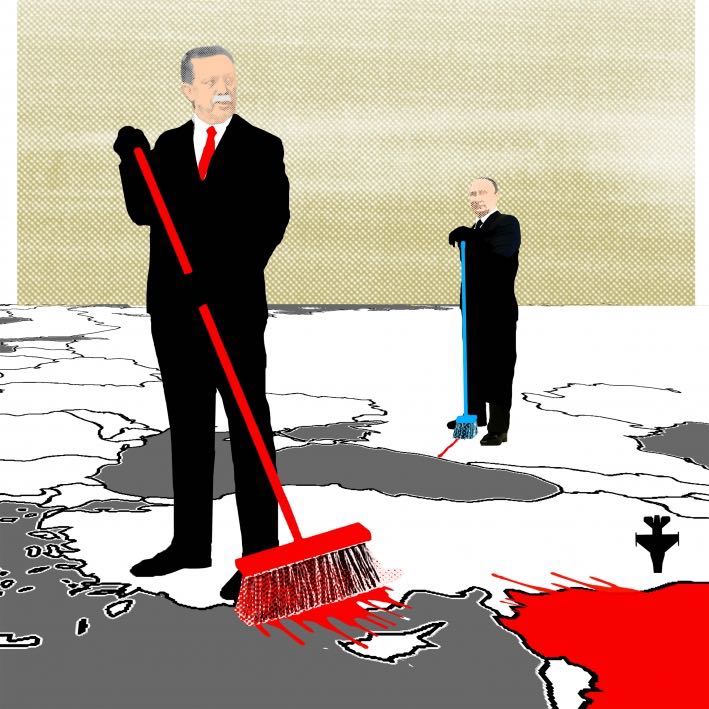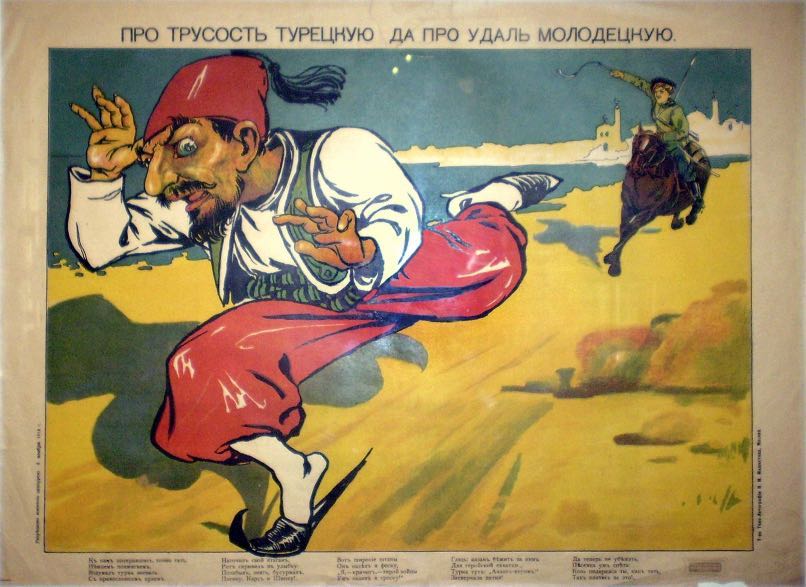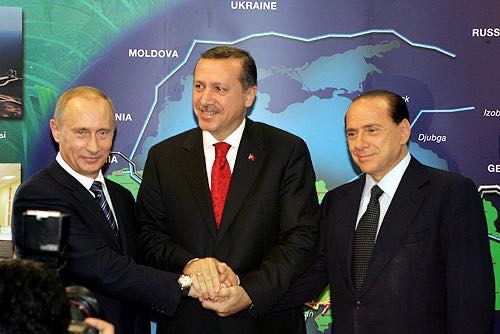5 augustus 2016
The failed military coup against president Erdogan will affect the foreign policy of Turkey. The military was focused on the West. Erdogan will probably shift to the East. The Kremlin has reason to be satisfied. Ankara and Moscow can now resume important joint economic projects, writes Fyodor Lukyanov, editor in chief of the journal Russia in Global Affairs.
 Illustratie Nanette Hoogslag
Illustratie Nanette Hoogslag
From the beginning, Turkey was one of the most active and ambitious players in the so-called Arab Spring that shook the foundations of the Middle East from 2010-2012. It is no surprise that such outward instability has seeped inward.
During the past five years of changes in the region, Turkey has come into conflict with practically all of its key partners, gotten mired in Syria’s internal intrigues, confronted a sharp escalation of Kurdish dissatisfaction, and undermined its own economy that until then had enjoyed impressive growth.
Turkish President Recep Erdogan apparently realized some time ago that the country was heading nowhere, and this is what prompted recent attempts at reconciliation with Russia and Israel. However, he needed a weightier pretext in order to extricate the country from the dead end into which he had driven it, and the attempted coup came as a strange but convenient gift in this regard.
{slider Volledige tekst|closed|icon}
Focus to the West or shift to the East?
The failed attempt to overthrow the president serves as a 'super-vote' of confidence for the leader, blotting out his previous failures. He now has carte blanche to do what he had found so difficult to accomplish since elections in June 2015. This primarily involves changing the constitution to transform Turkey into a presidential republic and entirely cleansing the state apparatus of disloyal or simply undesirable employees.
How will the impending changes affect foreign policy? The Turkish military has traditionally focused on the West, forming the cornerstone of Kemalism, the founding ideology of Turkey. The suppression of the uprising and its aftermath will most likely move the country in the opposite direction.
Ankara practically demanded that Washington extradite Fethullah Gulen, a Muslim cleric living in self-exile in the United States, whom Erdogan blamed for organizing the coup. However, the deportation of a person living in political exile violates U.S. principles and the request threatens to worsen the already strained relations between the two countries.
The Turkish authorities are speaking about reinstating the death penalty as if the question were already decided. This would end Turkey’s chances of joining the EU because it would apparently force Ankara to leave the Council of Europe. It would also thwart Turkey’s greatest aspiration of obtaining a visa-free regime with the EU. Brussels had promised to grant that request in return for Turkish cooperation on migration, but it had been frantically looking for a way to back out of the deal. Now Brussels will be only too happy to cancel it.
Ottoman traditions
As for the Middle East, where Erdogan and his colleagues had taken steps toward reviving the Imperial Ottoman tradition, the new situation makes it possible to distance themselves from the disastrous results of that strategy.
 Russian cartoon during First World War
Russian cartoon during First World War
Erdogan must have long ago realized that placing bets on the rapid fall of Syrian President Bashar Assad’s regime and increasing Turkey’s influence there was a losing gamble. Now, against the backdrop of efforts by Moscow and Washington to find a joint solution on Syria — and, symbolically, as U.S. Secretary of State John Kerry held active talks in Russia on the subject even as the coup unfolded — Ankara can withdraw into the shadows and proffer support for the U.S.-Russian initiative process. Of course, that does not mean that Erdogan’s ambitions will not resurface at the first promising shift in the regional situation.
It is possible that in the prevailing circumstances, Turkey will try returning to the path it had been sounding out prior to its Middle East gambit. That is, involvement in the affairs of Eurasia, a general shift toward the East and closer relations with Russia. Back in 2013, when Erdogan was still Turkish prime minister, he suggested during a meeting with President Vladimir Putin that his country might join the Shanghai Cooperation Organization. The Russian president reacted with some surprise at the time, and Erdogan has yet to show any serious intentions on that account.
What does this mean for Moscow?
If one overlooks Moscow's unflattering rush to return Russian tourists to Turkey after Ankara promised to guarantee their safety, the Kremlin has reason to be satisfied with the current state of affairs. Even if Erdogan mounts a hardline response to the attempted coup, his regime remains weakened. Shoring up his base at home also requires finding reliable partners abroad, and Erdogan’s zigzagging will hardly win him respect in any foreign capitals.
 Putin, Erdogan and Berlusconi during a final meeting on the project Blue Stream
Putin, Erdogan and Berlusconi during a final meeting on the project Blue Stream
Ankara and Moscow can now resume important joint economic projects that were suspended after Turkey downed a Russian fighter jet in November last year. However, tensions surrounding the so-called Turkish Stream project have not diminished, and worsening Turkish-EU relations will not increase Brussels’ desire to work with Ankara in such a sensitive area as the transit of strategic raw materials. At the same time, this might lend new importance to the Akkuyu nuclear power plant and Rosatom, having already invested money in the project, can now breathe a sigh of relief.
Despite their obvious differences and even antagonisms, Russia and Turkey are united by one thing — the fact that they are two great powers connected historically, culturally and geographically to a Europe that never fully accepted them as one of their own.
Following the Cold War, they both fell out of the “Greater Europe” project, based on European integration. Paradoxically, both Vladimir Putin and Recep Erdogan made great efforts in the early years of their rule to ensure that their countries were included in that project.
Three processes
Three processes are now occurring simultaneously. Russia and Turkey refuse to orient themselves toward Europe and the integration project has hit a severe structural crisis. The post-Cold War idea of a common European home has lost currency and European policy is backtracking all the way to the multipolar Europe of the 19th century.
Multipolar Europe was a time when competition between countries was the normal state of relations, small countries were a source of discord and a headache for everyone, and the “barbarians at the gate” — Russia and Turkey — were torn by feelings of both love and hate toward Europe proper. That situation generated constant conflicts and wars.
Of course, history never repeats itself exactly, and today’s situation differs in at least one way: Europe is no longer the center of the world. Earlier, if Europe sneezed, the whole world caught cold.
Now, however, three-fourths of humanity is simply uninterested in what ails these strange people with their oversized ambitions and diminishing ability to implement them properly.
Link to Russia in Global Affairs
{/sliders}
